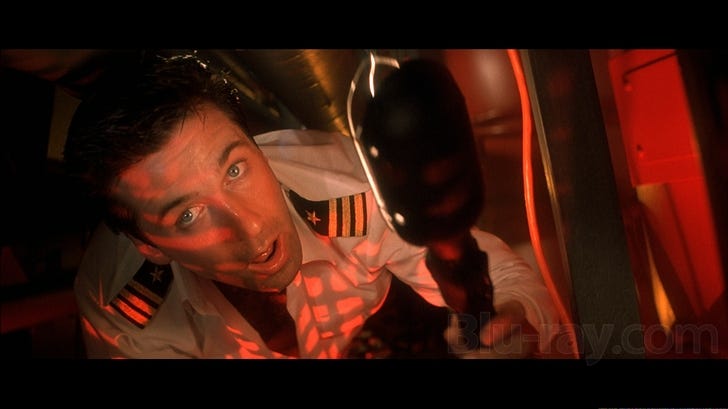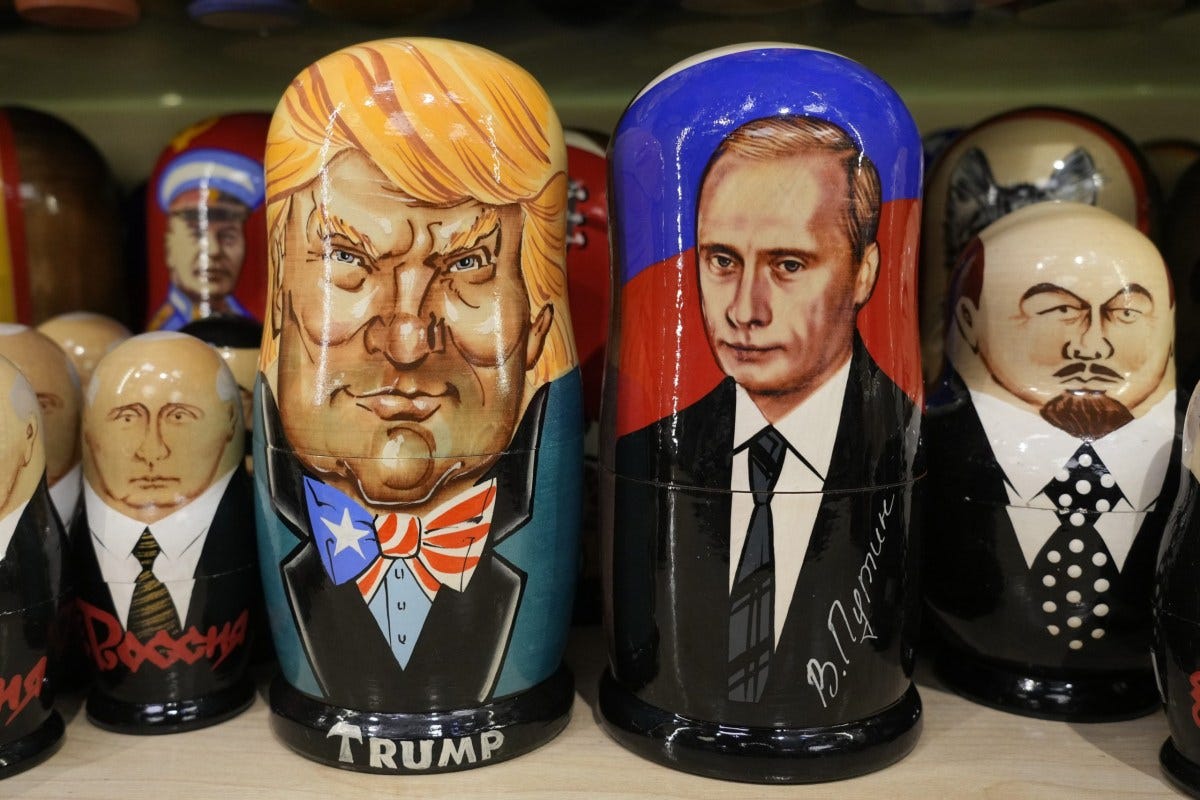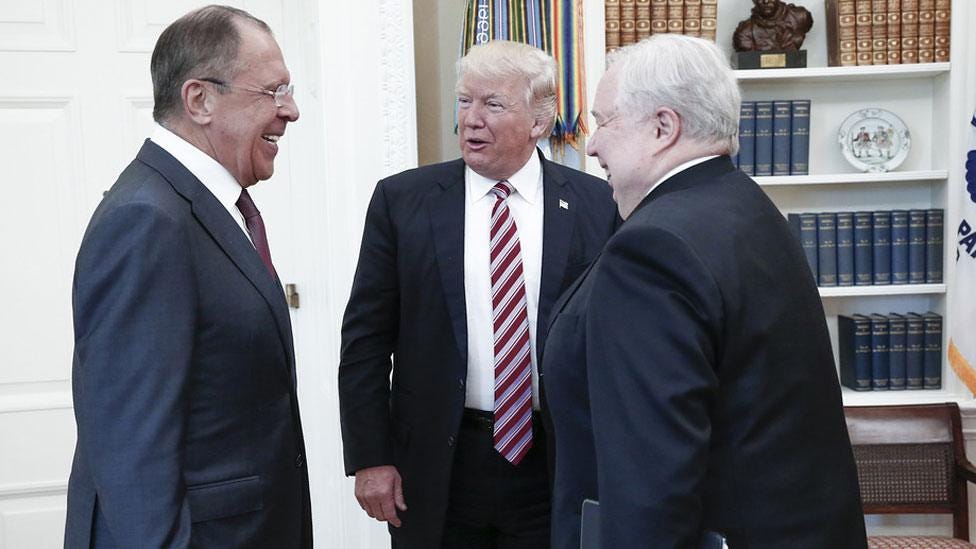 |
| Trump-Clinton Debate, Oct 19, 2016 |
The signs have been there. Trump publicly encouraged Russian cyberattacks on Hillary Clinton’s campaign. He later withheld aid from Ukraine to pressure them into smearing a political opponent.
After firing FBI Director James Comey for investigating Russian interference, he handed classified intel to Russian diplomats inside the Oval Office.
Now, with Trump in office, the surrender is accelerating. He’s shut down USAID, compromised CIA security protocols, undermined support for Ukraine, and appointed Tulsi Gabbard—long favored by Russian state media—as Director of National Intelligence. The Cold War, long considered won, is being undone from within.
This is not mere dysfunction; it’s capitulation.
The U.S. intelligence community warned us in no uncertain terms that Russia’s interference in the 2016 election was “sweeping and systemic.” The question is no longer whether Trump has sided with Russia—it’s how much further he’s willing to go.
Yes, America is far from perfect, as evidenced by today’s cruel and escalating attacks on immigrants of color. But our concerns in this moment are not about perfection or ideological purity. They’re about sovereignty—as Hillary Clinton tried to warn us.
And they’re about whether a once-principled political party will continue to enable a hostile foreign power at the expense of the nation it once claimed to serve.
I, too, am a patriot. And I agree with Stanford: this is nothing short of humiliating.
Read his piece. It’s sharp, detailed, even darkly humorous—and worth your time. You can find it on his Substack, The Experiment. Consider subscribing.
—Angela Valenzuela
P.S. This is not about education, but I know Jason and happy to share this.
Trump just forfeited the Cold WarTrump, a Russian asset since the '80s codenamed "Krasnov," has turned the US into a Russian satellite
Jason Stanford
Feb 22, 2025
Welcome to the weekend edition of The Experiment, your official hopepunk newsletter. If you’d like to support my work, become a paid subscriber or check out the options below. But even if you don’t, this bugga free. Thanks for reading!
Have I ever told you about the time I almost became a spy? I spent the summer after graduating high school at my late grandmother’s ranch in central Oregon. Two important things happened: The weekly newspaper ran an AP article about how the CIA needed people who spoke Russian, Arabic, and Mandarin, and I saw The Hunt for Red October on VHS. “Hey,” I said to myself as I watched the mess that Jack Ryan got himself into for writing a memo. “That’s a job!” I made up my mind to learn Russian and go into intelligence.
Keep in mind, this was the ‘80s, and the glide path was to become a stock broker or something to make money. Now, I had no money, and I grew up with so little money that I never even thought of ordering two scoops at Baskin Robbins, and restaurants with cloth napkins were a luxury reserved for special occasions. Even so, pursuing money held zero interest to me. Once my grandmother’s third husband asked me, “Don’t you want to get rich?” I snapped that I thought I’d just never get divorced so I could keep my money, but the truth was that I’d never considered the possibility not because it was unobtainable but because I couldn’t imagine anything duller than working just to make money.
“Hey, that’s a job!”
I wanted my life to matter and for my days to be spent doing something I enjoyed. And learning secrets and trying to stop the Russians from blowing up the world sounded like a lot of fun. Where do I sign? Learning the language was the easy part. A foreign exchange student in high school, I already knew German, and Russian is basically more complicated German in code. By the end of my first semester I was already telling jokes1 in Russian.2
Then it came time to apply for a job in military intelligence. My Russian professor at my liberal arts college and my classmates, safe to say, were not wild about my decision. I went to college when the Berlin Wall fell and the Soviet Union broke up. Mikhail Gorbachev’s glasnost policy opened up the censored state secrets, and soon Russia was holding real elections. The conventional wisdom was that Russia was becoming an ally and a western-style democracy, and the idea that I would sign up to spy on our new friends did not align with where nearly everyone thought things were headed. I didn’t necessarily disagree with that, but again, spying seemed like a load of fun.

"Next time, Jack, write a goddamn memo." Oh, how I wanted to write memos.
At first, the Navy loved me. They filled my head with visions of Officer Training School and spy bunkers, but then they gave me a physical. “Have you ever done drugs?” a nurse asked. I confessed to smoking marijuana eight times, which for my college was closer to DARE3 than daring. I’d just said no a lot more times than I’d said yes, and I told them I’d happily commit to clean living if it meant I could cosplay as Jack Ryan and write memos for the rest of my life.
“I’m sorry,” said the nurse. “The limit is three.” I was devastated and ashamed. My dad thought it was perhaps the funniest thing he’d ever heard. “In the ‘60s, they would have made you admiral,” he said. I spent my last semester of college in Moscow and then dabbled in journalism for a couple of years before returning home convinced that Russia would never fully embrace democracy. Russians often conflated capitalism and democracy, but even liberal democratic activists confessed to yearning for a strongman like Stalin. If you were interested in making the world a better place, investing cab fare in Russia was a waste of money.
And it never once occurred to me not to take my country’s side against Russia.

I wasn’t the only one who went to Moscow. In 1987, Trump: The Art of the Deal topped the The New York Times best seller list for many weeks, and with Gorbachev slowly opening up the country to western investment, Donald Trump went to Moscow in hopes of building a hotel.4 He didn’t get the hotel, but he did get recruited by the 6th Directorate of the KGB in Moscow, the counter-intelligence unit responsible for “recruiting businessmen from capitalist countries.”5
That’s according to a recent Facebook post by Alnur Mussayev, a retired intelligence officer that’s made the news in Great Britain but is being ignored by American journalists, maybe for good reason. “In 1987, our directorate recruited Donald Trump under the pseudonym Krasnov,” wrote Mussayev.
This could all be fantasy, but it would go a long way toward explaining what Anthony Scaramucci, who served as Trump’s White House communications director for 11 days in 2017, called Vladimir Putin’s “mysterious ‘hold’ on the president.” He wasn’t alone. H.R. McMaster, James Mattis, and John Kelly also couldn’t understand why Trump seemed to always take Russia’s side. “I don’t know why it’s like this,” he said on his podcast The Rest Is Politics: US. “McMaster couldn’t figure it out, Mattis couldn’t figure it out, Kelly couldn’t figure it out.”
It’s also backed up by what Yuri Shvets, a retired KGB major, told The Guardian four years ago. According to Shvets, it was the flattery of KBG offers that introduced the idea of running for office to Trump.
The ex-major recalled: “For the KGB, it was a charm offensive. They had collected a lot of information on his personality so they knew who he was personally. The feeling was that he was extremely vulnerable intellectually, and psychologically, and he was prone to flattery.
“This is what they exploited. They played the game as if they were immensely impressed by his personality and believed this is the guy who should be the president of the United States one day: it is people like him who could change the world. They fed him these so-called active measures soundbites and it happened. So it was a big achievement for the KGB active measures at the time.”
“In 1987, our directorate recruited Donald Trump under the pseudonym Krasnov.”
After returning home, Trump briefly explored a run for the Republican nomination for president, going so far as to speak at a Rotary Club luncheon in Portsmouth, New Hampshire. “If the right man doesn’t get into office,” he told the Rotarians, “you’re going to see a catastrophe in this country in the next four years like you’re never going to believe. And then you’ll be begging for the right man.”
“Krasnov,” by the way, is a last name in Russian that’s derived from krasota, a diminutive for krasa, the word for “beauty.” It’s the perfect choice to manipulate a vain, self-obsessed man, kind of like the time Putin called Trump yarkii, which means “brilliant” in the sense of “colorful” but which Trump interpreted as a compliment of his intelligence.
“I think when he calls me ‘brilliant,’ I'll take the compliment,” said Trump in 2016. “If he says great things about me, I'm going to say great things about him.”
It’s hard to remember how obvious all this stuff was back then. Trump openly encouraged Russia to engage in cyberattacks against Hillary Clinton’s campaign. When that proved fruitful, American political journalists were all-too-happy to treat the stolen materials like regular opposition research and not the illegally obtained evidence of a criminal attack by a hostile foreign power. And everyone acknowledged—except Trump—that this was all going on. He wasn’t exactly a sleeper agent.
“If he says great things about me, I'm going to say great things about him.”
But by that time, the Republican Party had been taken over like zombie ants by a Russian intelligence operation that began in 2015 with the Jade Helm6 embarrassment. “At that point, I’m figuring the Russians are saying, ‘We can go big time,’” said Michael Hayden, the former director of the CIA and NSA. “At that point, I think they made the decision, ‘We’re going to play in the electoral process.’”
It, uh, worked.
A bipartisan U.S. Senate committee concluded that the Russian government “engaged in an aggressive, multifaceted effort to influence, or attempt to influence, the outcome of the 2016 presidential election.” And the Mueller Report called Russia’s interference in the 2016 election “sweeping and systemic” and “identified numerous links between the Russian government and the Trump Campaign,” but Trump fired FBI Director James Comey for investigating his campaign in the first place, and the next day he handed over classified intelligence to Russian Foreign Minister Sergey Lavrov and the Russian ambassador to the United States, Sergey Kislyak, in the Oval Office like a goddamn puppet.

“No puppet. No puppet. You’re the puppet. No, you’re the puppet.”
Trump tried to withhold foreign aid to Ukraine to force them to dig up imagined incriminating evidence against Hunter Biden, and Republicans in Congress, like the good little zombie ants they are, did nothing. Actually, that’s not true. They fell in line and repeated Trump’s bellowing honk that this was all just the “Russia hoax.” The Party told them to reject the evidence of their eyes and ears. It was the final, most essential command, and so the Republican Party took sides against the United States of America when it came to Russia. If this weren’t so heartbreaking, I’d be more impressed with Russia’s feat.
Somehow, we—the west, NATO and all that—survived. When Putin threatened to invade Ukraine, Joe Biden learned from Barack Obama’s failure to appease Putin over Crimea in 2014. Biden didn’t just rally our European and Canadian7 allies, thus reasserting American leadership in the west that Trump had abdicated, but he innovated a new way of dealing with an international crisis by communicating intelligence about Russian movements in real time. This brilliantly pre-empted Putin’s disinformation attempts. Remember what it was like to have a President who took our side?
Trump has forfeited the Cold War.
Then 77,237,942 Americans made one very bad decision and re-elected Trump to the presidency, where he has, in one month, effectively surrendered to Russia.
Repeating Putin’s talking points and lying even more obviously than usual, Trump has begun negotiating away Ukraine’s territory to Russia and turned on Volodymyr Zelenskyy, whom he called an unelected dictator.
The White House ordered the CIA to send a list of new hires via an unclassified email server, making it possible for Russia and other hostile countries to identify our covert agents as well as their own citizens who are helping us.
He, through Elon Musk, shut down USAID, which doesn’t just pull back American soft power in the world but creates a vacuum to be filled by amoral state actors such as Russia, which celebrated Trump’s closure of USAID by issuing sneering insults. “The Trump administration has just put America last, while handing a gift to our biggest adversaries,” said a former USAID official.
And he installed Tulsi Gabbard, who very probably was compromised by a Kremlin agent and who has been described as “sympathetic … toward Russia” and “a favorite of Russia’s state media,” as the Director of National Intelligence, which is suboptimal to everyone but Putin.
Trump has forfeited the Cold War. A decades-long Russian intelligence operation has captured the White House and flipped our foreign policy to its advantage. Maybe this will all result in better poetry and comedy, but God help them if they reboot Hunt for Red October again.
I know America isn’t perfect. We’ve made some massive messes over the centuries. But we were founded on an aspiration to become a more perfect union, never reaching perfection but always getting closer. I don’t need my country to be perfect to take it’s side anymore than S needs to be perfect8 for me to love her forever. I am a patriot, and right now it feels humiliating to see our President hand his keys and his wallet over to Putin—and to see Republican elected officials and voters go right the hell along with him.
Anger and humiliation are not a way to survive the Trump Era. Next week I want to talk about something we might want to consider as a way to rebel against this unholy fuckery that is visiting this country. I think I might have an idea. See you next weekend. Until then, get outside and take a walk. Summer will be cooking us alive before you know it. Enjoy the chill.
No comments:
Post a Comment